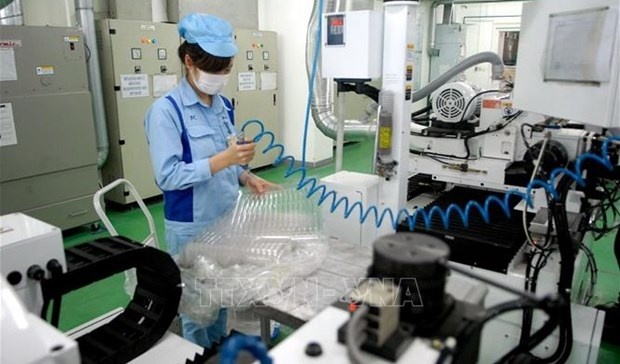INTERNATIONAL INVESTMENT
AND PORTAL
Viewed as an attractive investment destination, yet Vietnam still needs more attention to green and low-carbon economic development so as to sustainably attract foreign direct investment (FDI), according to experts.
 Vietnam attracted 31.15 billion USD in FDI capital in 2021, up 9.2 percent from the previous year (Photo: VNA)
Vietnam attracted 31.15 billion USD in FDI capital in 2021, up 9.2 percent from the previous year (Photo: VNA)
Hanoi – Viewed as an attractive investment destination, yet Vietnam still needs more attention to green and low-carbon economic development so as to sustainably attract foreign direct investment (FDI), according to experts.
Despite the COVID-19 pandemic’s serious impacts on global and domestic economic growth, FDI poured into the country still reached 31.15 billion USD in 2021, up 9.2 percent from the previous year, the Cong Thuong (Industry & Trade) newspaper reported.
Much of the capital was channeled into multi-billion-USD projects. For example, the Republic of Korea’s LG group raised its investment in Hai Phong city by 2.15 billion USD, the LEGO Group of Demark is going to build a factory worth 1 billion USD in Binh Duong province, and Japan registered over 1.31 billion USD for the O Mon No. 2 thermal power plant.
The FDI inflow into Vietnam continued in January 2022, with 2.1 billion USD, up 4.2 percent year on year.
Dr. Nguyen Dinh Cung, former Director of the Central Institute for Economic Management (CIEM), said after two years of the pandemic’s impact, the FDI wave has begun returning to Vietnam since late 2021, and the country is forecast to remain a magnet for foreign investors in 2022.
A recent survey by the Japan External Trade Organisation (JETRO) showed that 55.3 percent of the Japanese firms in Vietnam interviewed said they plan to expand their operations in the next one - two years, rising 8.5 percentage points from 2021.
Takeo Nakajima, Chief Representative of JETRO Hanoi, held that Vietnam will still be a popular choice for many Japanese enterprises in the time ahead.
However, World Bank Country Director for Vietnam Carolyn Turk recommended that to boost economic growth and attract FDI sustainably and effectively, the country should pay more attention to digital transformation and green technology application to production and business activities, which will help manage climate change impacts and adapt to this global phenomenon.
She noted the transition to green development will generate numerous opportunities for Vietnam, especially as Prime Minister Pham Minh Chinh made relatively ambitious statements about achieving net zero emissions by 2050 at the 26th UN Climate Change Conference (COP26).
This is a strong commitment helping address the global issue and improve Vietnam’s investment attractiveness as many major import markets are concerned about carbon emissions by factories in the country, according to her.
Sharing the view, many economic experts said consumers in developed economies currently care about not only product design or quality but also greenhouse gas emissions in manufacturing countries. They prefer the garment, electrical devices, and food made under eco-friendly production processes.
Therefore, developing a green economy is also an important factor helping Vietnam become more competitive in investment attraction, they added.
VNA



















